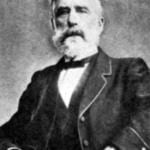Some Christians are uncomfortable either with their world or their place in it. The rise of anti-liberalism among some Roman Catholic intellectuals is one indication of it. Calls for radical Christianity, which have been around since the 1970s, is also part of such discomfort. If American society is not suitable or comfortable for Christians, then what might a Christian-friendly place look like? Roger Olson recalled his own Christian upbringing as one way that Christians avoided worldliness and carved out their own cultural niche. It was not necessarily the source of high Christian art — more jello salads at potluck dinners, missionary slide shows, and schmaltzy gospel music — but Olson’s boyhood congregation was not confusing this world with the world to come.
Other Christians, one particularly drawn to Rome or Canterbury, long for a Christianity that can rival secular society culture for culture. Richard John Neuhaus sometimes dabbled in calls for a culture that was distinctly Christian:
Christians who, knowingly or unknowingly, embrace the model of “Christ without culture”—meaning Christianity in indifference to culture—are captive to the culture as defined by those who control its commanding heights. They are not only captive to it but are complicit in it. Their entrepreneurial success in building religious empires by exploiting the niche markets of the Christian subculture leaves the commanding heights untouched, unchallenged, unengaged.
Christianity does indeed have its own culture, its own intellectual tradition, its own liturgy and songs, its own moral teachings and distinctive ways of life, both personal and communal. The Church must carefully cultivate that culture and, in times of severe persecution, cultivate it, if need be, in the catacombs. We are, after all, in Babylonian exile from our true home in the New Jerusalem. But in America today, there is ample opportunity to follow the admonition of the prophet Jeremiah to seek the peace and well-being of the earthly city. Christians who, embracing the model of “Christ against culture,” invite us to take refuge in the catacombs of their own imagining are not helpful in that task. . . .
While religion flourishes here in America, it is largely of the Christ-without-culture variety. What in recent decades have been the distinctively Christian contributions that deserve to command the attention of the cultural gatekeepers of America? In literature and the arts, in music and entertainment, in political philosophy and the humanities, such contributions are few and far between.
Why is the assumption behind defenses of Christendom or arguments for Christian forms of culture that Christian devotion must be evident, something to be seen or heard or felt, if it be true faith? John Updike was some sort of Protestant and did not pretend to write Christian novels. For his writing to be Christian he needs to self-identify as a Christian novelist? And what about plumbing? Do Christian plumbers use different valves and pipe fittings than non-Christian plumbers?
In other words, if Christianity involves walking by faith and not by sight, if the fruit of the Spirit — like love, joy, peace, etc., — are internal, psychological, or intellectual goods, why do some Christians want to live in a culture that says, apparently, “Look at me. See I am a Christian culture”? In the Sermon on the Mount, Jesus warned repeated about not looking at externals, not fasting, tithing, or praying in public, because what is done in secret is what matters. God sees that sort of devotion. Everyone else can listen to Bach or read Dostoevsky.
What is curious about Neuhaus’ pining for Christian culture is his admission, likely learned from his Lutheran upbringing, that Christians live in exile. Living as a stranger or refugee means not expecting the host society to reflect the culture that is your real home. An American living in Warsaw does not expect Poland to have what she had access to and experienced in the United States. She likely participates in Polish culture with the recognition that this is foreign and unfamiliar. At the same time, while she waits to make enough money for a return trip to the U.S., she learns Polish ways. Poles undoubtedly sense that she isn’t a native Pole and notice by the way she crosses the street (jaywalking) or by the way she speaks Polish with an American access. But why would she try to replicate American patterns while in Poland? And why would she avoid Polish society because it’s not American?
So what is the appeal of creating a Christian culture on planet earth when a Christian’s home is, like her Lord’s kingdom, not of this world? It looks to me like one more instance of immanentizing the eschaton, of trying to make earth look like heaven.












